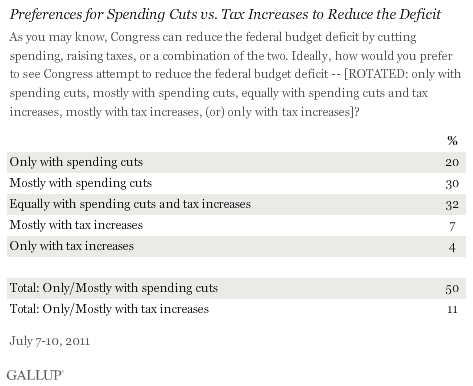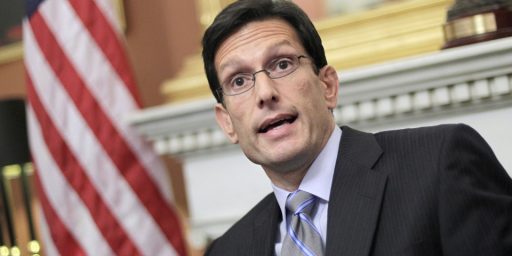Obama Walks Out of Talks Saying ‘Don’t Call My Bluff’
President Obama has walked out of negotiations on the debt ceiling with an agreement is nowhere in sight.
President Obama has walked out of negotiations on the debt ceiling.
Politico (“President Obama abruptly walks out of talks“):
President Barack Obama abruptly walked out of a stormy debt-limit meeting with congressional leaders Wednesday, a dramatic setback to the already shaky negotiations. “He shoved back and said ‘I’ll see you tomorrow’ and walked out,” House Majority Leader Eric Cantor (R-Va.) told reporters in the Capitol after the meeting.
On a day when the Moody’s rating agency warned that American debt could be downgraded, the White House talks blew up amid a new round of sniping between Obama and Cantor, who are fast becoming bitter enemies.
When Cantor said the two sides were too far apart to get a deal that could pass the House by the Treasury Department’s Aug. 2 deadline — and that he would consider moving a short-term debt-limit increase alongside smaller spending cuts — Obama began to lecture him.
“Eric, don’t call my bluff,” the president said, warning Cantor that he would take his case “to the American people.” He told Cantor that no other president — not Ronald Reagan, the president said — would sit through such negotiations.
Democratic sources dispute Cantor’s version of Obama’s walk out, but all sides agree that the two had a blow up. The sources described Obama as “impassioned” but said he didn’t exactly storm out of the room.
“Cantor’s account of tonight’s meeting is completely overblown. For someone who knows how to walk out of a meeting, you’d think he’d know it when he saw it,” a Democratic aide said. “Cantor rudely interrupted the president three times to advocate for short-term debt ceiling increases while the president was wrapping the meeting. This is just more juvenile behavior from him and Boehner needs to rein him in, and let the grown-ups get to work.”
On exiting the room, Obama said that “this confirms the totality of what the American people already believe” about Washington, according to a Democratic official familiar with the negotiations, and that officials are “too focused on positioning and political posturing” to make difficult choices.
Cantor insists he never interrupted the president, and was “deferential,” seeking permission to speak.
The Hill (“Obama warns Cantor: ‘Don’t call my bluff’ in debt-ceiling talks“):
A Democratic source familiar with the negotiations said the reports of a dramatic or abrupt walk-out by Obama were overblown, but the source acknowledged that the president “said what he was going to say, he got up and walked out.”
“The climax of the meeting was the president basically saying ‘what’s happening in this room confirms what everybody across the country thinks about Washington, D.C.,'” the official said. “Which is that people are more interested in protecting their base and political positioning than solving problems.”
The differing accounts came after the fourth day of White House debt talks in a row.
Cantor said Obama became “agitated” when the House majority leader said Republicans were now open to holding two votes to increase the debt ceiling between now and the 2012 elections, which the president has rejected.
Obama said he wanted congressional leaders to decide by Friday what approach to take on the debt limit. The Treasury Department has set an Aug. 2 deadline for lifting the ceiling, and ratings agencies are warning that they will downgrade U.S. credit if Congress doesn’t act — an action that could send markets tumbling.
“We are very far apart right now,” Cantor said he told the president. “I don’t know if we can get there.”
Cantor said he asked Obama if he would consider allowing two votes on the debt ceiling to give leaders more time to negotiate additional budget savings while avoiding a calamitous default.
ABC News’ Political Punch (“Obama: ‘This May Bring My Presidency Down, but I Will Not Yield’ on No Short-Term Extensions“):
The president — frustrated — said there would be no short term extensions. It would be bad for the economy, and resolving the deficit issue certainly won’t be easier next year in the throes of the political season, he said.
If we can’t do this now, we won’t be able to do it next year, he said.
“This process is confirming what the American people think is the worst about Washington,” the president said. “Everyone is more interested in posturing, political position and protecting their base than in solving problems.”
He said we can get a lot of savings “if the spirit changes from why we can’t do things to why we can.
“I have shown enormous willingness to compromise and have taken huge heat for it,” he said, “but my responsibility is to the American people and there comes a point when I need to say, ‘Enough.'”
“It cannot all be on us,” the president said, arguing that Republicans need to give on the revenue side of things as Democrats are willing to do so on spending cuts.
“Don’t call my bluff,” the president said. “I am not afraid to veto and I will take it to the American people.”
If Moody’s, the credit rating agency that announced a review of U.S. credit, downgrades the United States, President Obama said, “it will be a tax increase on every American.”
There needs to be a long-term debt extension, the president argued.
“This may bring my presidency down, but I will not yield on this,” he said.
Then he stood up.
“Enough is enough,” the president insisted. “We have to be willing to compromise. It shouldn’t be about positioning and politics, and I’ll see you all tomorrow.”
Then he left the room.
Now, frankly, I don’t expect Congressmen to be deferential to the president. They’re constitutional equals, not subordinates, and can interrupt all they want in private meetings. In this capacity, Obama is merely the nominal head of government. Only in ceremonial occasions, such as the State of the Union address, is the president acting as head of state and entitled to expect a certain amount of decorum.
But, whether he stormed out or merely decided that he needed to cool off and resume tomorrow, I understand Obama’s frustration. He’s already negotiated a budget deal with Congress authorizing the year’s spending; having to renegotiate under a gun because an arbitrary “debt limit” has been reached shouldn’t be necessary.
We’re coming down to the wire on this and it doesn’t look good.
WSJ’s Washington Wire (“Alan Simpson: ‘No Hope’ of Debt Ceiling Agreement“)
Former Sen. Alan Simpson (R., Wyo.), who co-chaired the White House’s deficit reduction panel last year, said he has lost hope the White House and Congress will be able to reach a deal to raise the debt ceiling by Aug. 2.
” I don’t think they’ll get it done,” he told Washington Wire. “I did for a long while. Now that I see the total rigidity of the parties, if that is going to continue, there’s just no hope. I thought there would be.”
Mr. Simpson led the White House’s deficit-reduction panel with Democrat Erskine Bowles last year, and issued a proposal that would cut roughly $4 trillion from the deficit over 10 years. The package included spending cuts and the elimination of certain tax breaks and it won an unexpected level of support from both parties.
But the proposal ran into resistance in Congress, where many Republicans objected to the tax changes and many Democrats objected to changes in Social Security and Medicare.
Default is an unacceptable option, not least of which because it would exacerbate the debt problem that we’re supposedly trying to solve. And the ratings agencies are issuing dire warnings:
Credit rating agencies moved closer to an unprecedented downgrade of the U.S. government’s debt amid deteriorating talks in Washington, with President Barack Obama abruptly walking out of a key meeting Wednesday with Republicans seeking a deal to raise the federal borrowing limit.
Moody’s Investors Service said it was reviewing the government’s top Aaa bond rating for a possible downgrade, citing the “rising possibility” that the government’s $14.29 trillion borrowing limit won’t be raised soon enough to prevent the U.S. from running out of money to pay its bills.
Pimco boss Bill Gross:
An actual default — or even the threat of one — might set off a chain reaction that would raise Treasury bond yields by 25 basis points (a quarter of a percentage point) or more, pushing up the cost of debt throughout American financial markets. Moody’s, the bond rating agency, just Wednesday put America’s AAA credit rating on review for potential downgrade, roiling equity and bond markets alike in the aftermath. If an extra 25 basis points becomes the new benchmark, federal interest expenses might increase by $30 billion to $40 billion annually over the ensuing years as $1.5 trillion of new debt is issued each fiscal year, complicating efforts to narrow budget deficits.
[…]
The U.S. dollar is the global reserve currency, producing daily liquidity for trillions of dollars of transactions between trading nations. The greenback earned that status from decades of balance-sheet conservatism and strong economic growth. Now, as the ratio of federal debt to gross domestic product creeps closer to 100 percent — symbolic of AA, not AAA, status — and our growth rate remains mired at a 2 percent annualized rate, countries that have reserve surpluses (China and a host of petroleum exporters) are rethinking their currency preferences. A ratings downgrade or an actual default could reduce the willingness of these countries to do business in dollars, jeopardizing trade receivables and overnight letters of credit in the process. Recent defaulting sovereigns such as Argentina and Russia prove that commerce is difficult to restart once a seller is unsure of being paid in a currency that represents a store of value and is considered “money-good.” If our government doesn’t give a damn about the greenback dollar and its solvency, why should we expect others to protect its status as a reserve currency — a privilege that, by the way, lowers our interest expenses by an estimated $30 billion annually?
Yet both sides are clearly willing to risk it rather than give in.
Nate Silver (“G.O.P.’s No-Tax Stance Is Outside Political Mainstream“) analyzes the polling thus far:
The Republicans in the House of Representatives are extremely conservative on fiscal matters and are significantly out of step with the public as a whole. Given that Democrats continue to control the Senate and the White House, and that their votes may be necessary in the House as well, this makes compromise nearly impossible.
Consider, for example, the poll that Gallup released today, which asked Americans whether they prefer tax increases or spending cuts as part of a deal. Preferences were weighted toward spending cuts:
Few Americans, however, take the view that spending cuts alone should be made in a deal, with no tax increases at all. In fact, only 26 percent of the Republican voters surveyed in Gallup’s poll took that position, along with 20 percent of voters overall.
Now, this strikes me as an odd reading of that poll. A majority want the deal done only/mostly with spending cuts, compared to a paltry 11 percent for only/mostly tax increases. So, the Republicans are starting off on much stronger ground. But the “no compromise” position puts them in a 20 percent minority. The sweet spot is somewhere in the mostly with spending cuts/equally with spending cuts and tax increases middle ground, which enjoys 62 percent support.
Not only are the Republicans forcing this showdown but they’re not even putting on a united front; Speaker John Boehner and Senate Leader Mitch McConnell don’t have the support of their caucus for any concessions at all on the revenue side–even closing obvious loopholes–which means they can’t bargain in good faith. Yes, the Democrats are technically just as willing to risk default to avoid giving in. But they’re giving more and, again, they’re not the ones playing chicken based on an arbitrary ceiling that’s historically simply waived off.
This is shaping up much like the 1996 showdown between President Clinton and the Newt Gingrich-led Republican Congress which led to a government shutdown. Clinton initially got the blame for that one because the public siding with the GOP on spending cuts. But Gingrich and company overplayed a winning hand and ultimately paid a huge price for it.








If Congress could pass a budget, with spending and tax in reasonable balance, they wouldn’t be there in the first place.
We kind of accept that the President, as “big chief,” will generate plans and send them down to Congress … but I’d say that is an extra-constitutional role.
In theory, and under the Constitution, Congress should solve these things themselves.
(Now, once passed, there is the veto thing, yes. But if Republicans weren’t playing this agreement against “Obama 2012” I think that would be less of an issue. The budget would have been done already.)
“Affirmative action” doesn’t actually work in the real world.
Barry Ritholtz has an amusing observation:
“Forbes editors appear to have been abducted:
Does Anyone Still Remember Why We Have The Bush Tax Cuts? (Forbes Blog)
The Rich Are Now Richer Than Before The 2008 Credit Meltdown (Forbes Blog)
A Country in Denial About Taxes (Forbes Blog)”
(I liked Forbes back in the old Malcolm days, but less after. Maybe good days are ahead.)
A fairly small percentage of people prefer a package composed solely of spending cuts. Most people prefer a package that is predominately spending cuts, which was on the table. However, the small group that wants to do it with spending cuts alone controls the GOP. Why aren’t the GOP Congressmen and Senators representing all of their voters?
Steve
The bottom line of that poll is that 73% of the respondents are OK with some amount of revenue increases in the mix. That means that the Republicans – who are the ones waging assymetrical warfare – are willing to crash the economy to placate 27%. Really? The last mix I saw from the White House was something like 85:15 cuts:revenue. My guess is if you asked the nation if they would want that deal or a post-default economy a lot more than 73% would be clamoring for the deal.
House members King, Bachmann, and Gohmert all say the debt ceiling doesn’t matter – we can crash right through it. I saw at least three more House memebers whose names I can’t remember say the same thing on TV last night including one guy on YouTUbe calling the President a liar. So the fact is that Republicans can’t pass any deal – that’s NO DEAL – through the House without Democrats. That’s a pretty empty hand to be bluffing with when the stakes are this high.
Isn’t the real story here how effectively Cantor and the teahadists have deballed the Speaker? You can almost feel sorry of Boehner. He’s worked long and hard to get where he is only to find where he is is nowhere that really matters.
I know it seems like a little thing when facing another possible global financial meltdown, but how the hell is Obama or anyone in those negotiations supposed to do anything if Eric Cantor is going to go running to the media and immediately reveal everything that’s said?
Mike
@MBunge: In fairness, Obama said he would also take it to the American people. But Cantor is coming off looking like he’s way out of his league.
If the unfortunately likely default causes a downturn on top of a recession, the only reasonable word for what will follow is a depression. Depressions last a looong time. And depressions cause (as well as lots of pain and lost careers) political realignment. Pause and consider that the depression of 1930-40 caused southern sheriffs and the old dixie aristocracy to join union members in Detroit and college professors in Cambridge in voting FDR for 4 terms. That would have seemed to anyone observing the world of the 1920s to be an absolute impossibility.
One thing is certain: That a depression caused by blindly following an ideology will have a very bad outcome for that ideology.
MBunge…
Of course you are correct…and of course what he is running to the media and saying, and what is is running to the jr. members of the house and saying, is not correct.
For instance:
http://plainblogaboutpolitics.blogspot.com/2011/07/in-which-i-have-unkind-words-about-eric.html
Robert Reich makes a politically cynical, but perhaps prescient, argument that:
Mitch McConnell Will Win the Day
It’s what I’ve suggested here in the past, that the GOP wants 2012 to be (yet another) mandate on tax.
But … if the poll above is accurate, they aren’t just overplaying their hand in this negotiation, they may be blowing the election cycle.
Are we moving from “jumped the shark” to “jumped the shark, big time?”
MBunge,
Because Cantor want Boehner’s job so bad he can taste it. No matter what the grownups try to do in negotiations, Cantor will shoulder his way into the media to get attention. He shouldn’t even be in the room, but Boehner doesn’t have any control over him…
James, Mark Kleiman pointed out that the ‘don’t call my bluff’ statement allegedly made by President Obama is unlikely, unless he had a sudden case of the dumbs. IIRC, there’s no real record of it, and no reporters would have been present.
Do you really think Cantor and Boehner have much of a “winning hand” though?
Seems they can get everything they want from the president, who many people consider half a Republican anyway, without driving the country to ruin. Sure, they might have to compromise on revenues, but a compromise is not an outright loss and can be spun as a “mostly win.”
Rather, I think Obama hit at the heart of the matter when he said:
Lurking deep in the GOP’s fiscal arguments about the debt is the strategic imperative to bring the president down. If I remember correctly, that was also a dynamic at work during Gingrich’s day.
Maybe it’s not overplaying a winning hand so much as trying to play two different games at the same table.
Aren’t the Democrats giving in plenty if they’re discussing cuts of 2-4 trillion? The GOP is getting 95% of what they want, yet they refuse to “deal” until they get 100% of what they want. That’s not a deal, that’s locking yourself in your room and not coming out until you can get your toy.
@Barry: We’ve got at least three reputable, non-Republican sympathetic, news outlets reporting this.
Whether the exact phrase was uttered or Obama stormed out or merely ended the meeting strike me as largely irrelevant. He’s clearly frustrated and has every right to be.
Which it seems like the dems have already offered, giving up HUGE concession and the republicans still say no. Much like the health care fight where the dems ended up fighting tooth and claw to get the GOP to accept they had won (with a bill barely different than the 90s republican alternative to hillary care) the right won’t even accede when they’re inexplicably given a stupidly great deal for them.
The GOP wants no tax increase until 2012, so that the election can be about no tax increases.
Think about how important this is to them in those terms. If they increase taxes, even $1, how can they run on “no new taxes?”
What is lost I think in the “both sides are to blame” narrative that Alan Simpson and others promote is that there are a significant number of Republican congressmen who simply do not want to raise the debt limit ceiling at all. Under any deal. They do not want a deal and they have said so. That is quite different from the Democratic side (which looks very much like the “sane” side to me.)
Poor turn of phrase (frustration can do that). If the other guy’s bluffing, you absolutely want to call…
@john personna: The problem for the GOP is the hardcore base has come to believe that hitting the debt ceiling has no consequences. If they hadn’t been willing to let that one take root, they could accept the revenue increases and come out of it saying Obama was willing to risk everything over those increases, and they weren’t willing to let the economy collapse. Put the full burden of the revenue increases on Obama and deflect it from themselves. But they can’t easily argue that with the position they’re in now, they would have to say their playing a suicide game right now and they haven’t been willing to do that.
Bruce Bartlett compiles a bunch of polls and leaves me wondering…Just who is the Republican leadership protecting?
http://capitalgainsandgames.com/blog/bruce-bartlett/2309/people-support-higher-taxes-reduce-deficit-2-1-margin
Right. So a large majority of the public favors a deal that is a combo of taxes & cuts. One can certainly argue that the majority opinion of the public is wrong (after all, the public is breathtakingly ignorant about what we actually spend on, how our taxes actually work, etc), but one cannot in good faith argue that a majority of the American people want to balance the budget with spending cuts alone.
@Rob in CT:Have you never heard the phrase “Don’t call my bluff” before? It is almost universally understood as a warning that means “I’m not actually bluffing”. There’s a whole post and comment thread over at The Corner of people who don’t grasp that, but I thought it was just because they’re pretty far gone over there.
Mike
@Dustin:
I liked Martin Wolf’s observation in the Financial Times. Basically he noted that true revolutionaries are willing to break some eggs to make the omelet.
If you are far enough out there, you will accept damage on the way to a better world.
@MBunge:
No, actually. But then I don’t gamble, so it may really be that I don’t understand this. I figured the appropriate line would be “Eric, I’m not bluffing. Call and you’ll find out.” If “Don’t call my bluff” means that, ok I guess, but I’ve never heard it.
@john personna:
Yeah, there are a lot of folks who know there will be pain (though I figure they fancy it won’t be THEIR pain), and are up for it since they figure it’s pain now or pain later, let’s get it over with. That’s simplistic and wrong, I believe, but that’s the idea. Not “no consequences.” There is a group that really WANTS to burn it down.
Apparently, I’m not the only one to realize Cantor is a complete idiot…
Not “who” but “what”…a failed and useless ideology…
Oh, please. Call his bluff, guys, he’s got nothing and everyone knows it. The polling is running two to one against raising the debt ceiling as I said yesterday.
Fact is, Barry, you’re already done… Your presidency is already over. That ship sailed months ago. This is you desperately trying to regain the high ground in the minds of the voters, here… and… read the polls, Barry… it’s not working. You own this fiasco, Barry… it’s all on you. No wonder you’re frustrated.